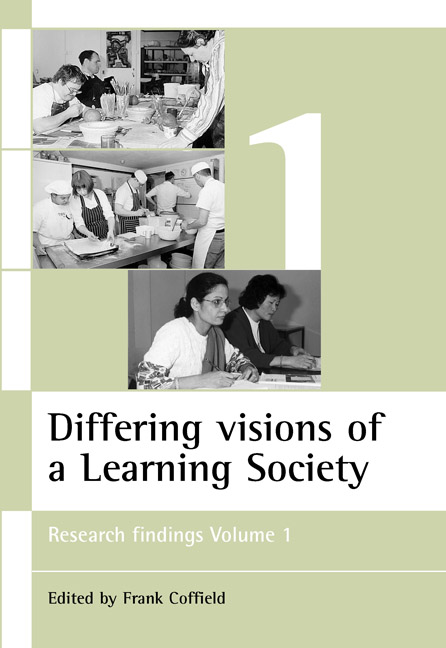Book contents
- Frontmatter
- Contents
- Notes on contributors
- Introduction: A critical analysis of the concept of a learning society
- one ‘Worlds apart’ – Education markets in the post-16 sector of one urban locale 1995-98
- two Unifying academic and vocational learning in England, Wales and Scotland
- three Skill development in higher education and employment
- four The variable contribution of guidance services in different types of learning societies
- five Changing patterns of training provision in the National Health Service: an overview
- six Working and learning in Britain and Germany: findings of a regional study
- seven Development of knowledge and skills at work
- Index
seven - Development of knowledge and skills at work
Published online by Cambridge University Press: 05 July 2022
- Frontmatter
- Contents
- Notes on contributors
- Introduction: A critical analysis of the concept of a learning society
- one ‘Worlds apart’ – Education markets in the post-16 sector of one urban locale 1995-98
- two Unifying academic and vocational learning in England, Wales and Scotland
- three Skill development in higher education and employment
- four The variable contribution of guidance services in different types of learning societies
- five Changing patterns of training provision in the National Health Service: an overview
- six Working and learning in Britain and Germany: findings of a regional study
- seven Development of knowledge and skills at work
- Index
Summary
Introduction
Our proposal argued that policy discourse about education and training is focused mainly on formalistic aspects of provision and achievement. Provision is defined in terms of how training is delivered or facilitated. Achievement is defined in terms of qualifications and credits with rather less attention to gains in knowledge, skills or capability which escape formal assessment. Hence, we chose to study learning at work without making any prior assumptions about its connection, or lack of connection, with education and training. Our three main questions were:
• What is being learned at work?
• How is learning taking place?
• What other factors affect the amount and direction of learning in the workplace?
Our focus was on employees at the professional/managerial and technical/supervisory levels in three occupational areas, engineering, business and healthcare.
This relatively un-researched domain posed several theoretical and practical problems, critical to developing and defining The Learning Society. Hence our aims emphasised the pioneering nature of the research, preparing the way for others to follow. These aims were:
• to collect and analyse evidence from three occupational areas about the learning of knowledge and skills in employment;
• to develop research methods for investigating learning in employment;
• to develop a theoretical framework for interpreting the findings and guiding future research in this area;
• to contribute to the development of thinking across The Learning Society Programme.
The primary purpose of this report is to describe and discuss the main findings of the project and their practical and theoretical implications for policy and research. For more detailed analyses of the various aspects of the project's work, readers are referred to project publications and our forthcoming book.
Theoretical foundation
The formalistic emphasis of education and training policy treats learning as a self-conscious, deliberate, goal-driven process which is planned and organised by ‘providers’ to yield outcomes that are easily described and measured. Our starting assumption was that, although a great deal of important learning is attributable to formal contexts and frameworks which fit these assumptions, this paradigm fails to capture much of the learning that occurs in the workplace. Yet challenging this dominant paradigm renders our research questions highly problematic. What is to count as knowledge if it is not defined in terms of the outcomes of education and training or research? How will one detect learning in non-formal settings if it is not planned, measured or talked about, possibly not even conscious?
- Type
- Chapter
- Information
- Differing visions of a Learning Society Vol 1Research Findings, pp. 231 - 262Publisher: Bristol University PressPrint publication year: 2000
- 4
- Cited by

